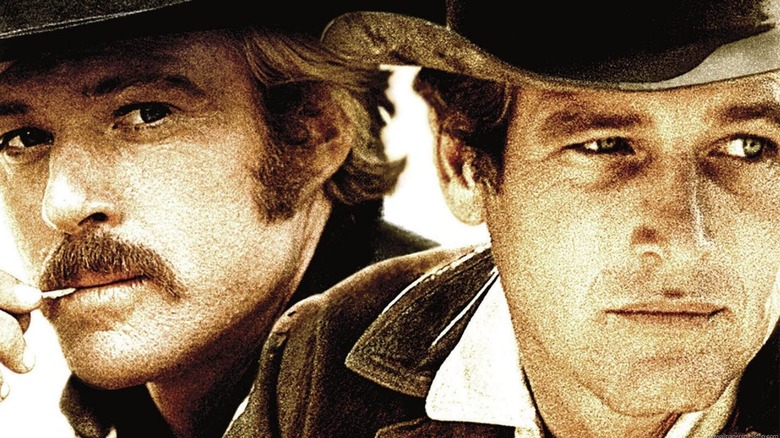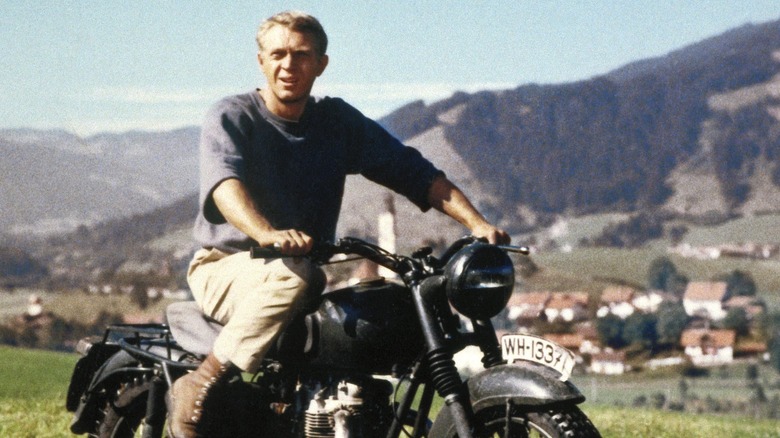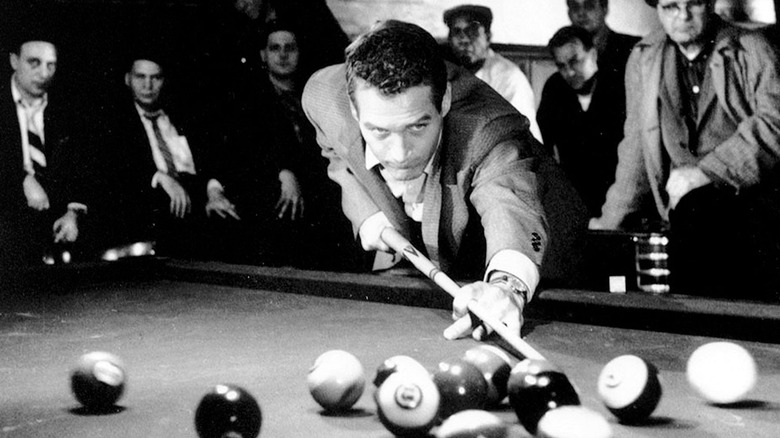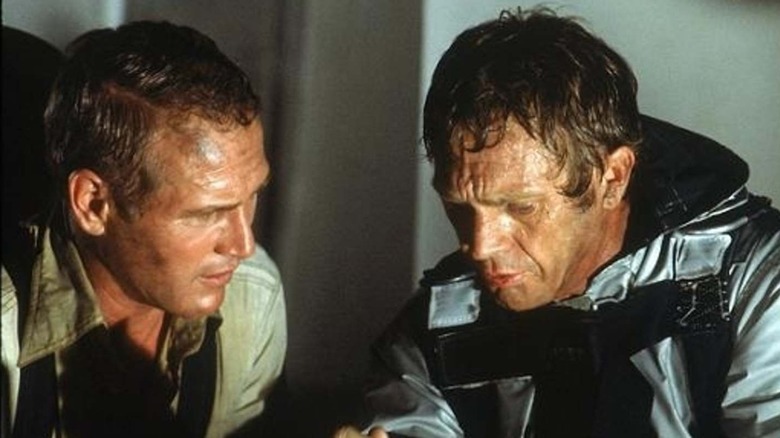Why Steve McQueen Refused A Role In Butch Cassidy And The Sundance Kid
From J-Lo's long list of outrageous on-set demands to Christian Bale chewing out a crew member behind the scenes of "Terminator: Salvation," Hollywood has a long and colorful history of prima donnas and difficult actors. Two of the champs, the famously tetchy Val Kilmer and the legendarily bizarre Marlon Brando, even teamed up on "The Island of Dr. Moreau" to scupper the career of director Richard Stanley.
Another Hollywood legend with a reputation for being difficult to work with was Steve McQueen. Labelled the "King of Cool" as much for his rebellious offscreen persona as his string of hit movies in the '60s, McQueen led an action-packed lifestyle and died at the age of 50, leaving behind a series of iconic screen roles. While his legacy is impressive enough, with classics including "The Great Escape," "Bullitt," and "The Magnificent Seven," he only received one Oscar nomination in his career, Best Actor for "The Sand Pebbles."
It's tempting to wonder what his trophy cabinet would have looked like if he hadn't turned down parts in "Dirty Harry," "The French Connection," and "One Flew Over the Cuckoo's Nest," among others. In the late '60s, as his career was on the up, McQueen also walked away from "Butch Cassidy and the Sundance Kid," George Roy Hill's rose-tinted, good-natured buddy western that became the top grossing movie of 1969 and earned a Best Picture nomination.
The Troublesome "King of Cool"
McQueen had a troubled childhood, routinely suffering abuse before ending up in reform school for petty crime as a teen. He joined the Marine Corps at 17 and didn't cope well with authority, finding himself busted down to private on several occasions. On the flip side, he proved himself a hero by saving the lives of five men who went overboard when his ship hit a sandbank in the Arctic.
After honorable discharge, he had a variety of jobs, including lumberjack and working in a brothel, before enrolling in a New York acting school. His breakthrough film role came seven years later when he made his screen debut in the sci-fi monster movie "The Blob."
In his personal life, he was a lover, cheat, and alleged wife-beater who married three times; a pothead and a martial artist who trained with Bruce Lee; a fitness freak as well as a heavy drinker and smoker; an avid racer who was once arrested for drunk driving. He even made Charles Manson's kill list, missing the fateful dinner at Sharon Tate's house because he was having a one-night-stand. A few months earlier, McQueen had a fight with Manson and broke his nose.
McQueen's career was on the rise when he read William Goldman's script for "Butch Cassidy and the Sundance Kid," a rollicking yarn loosely based on the real-life tale of the Hole-in-the-Wall gang. Reading for the lead role was Paul Newman. In the '50s, McQueen had a bit part in "Somebody Up There Likes Me," the Rocky Graziano biopic that gave Newman his breakthrough role. McQueen was in no mood to play second banana to Newman this time around...
Paul Newman, the Hollywood legend
Paul Newman was, in many ways, the complete opposite of Steve McQueen. He had a relatively normal upbringing, served in WWII, and married the love of his life, Joanne Woodward, in 1958 after divorcing his first wife. They would spend the next 50 years together until his death in 2008. If McQueen was the edgy "King of Cool," Newman's charisma was more laidback. He was a man who was comfortable in his own skin, and his charisma was matched by his innate sense of dignity, which shone through even when playing outright despicable characters.
While he lent his voice to numerous causes, he liked his personal life to stay, well, personal, buying a Connecticut farmhouse and largely shunning the limelight. Like McQueen, he enjoyed racing cars and had some success at it. He had his own racing team, won championships, and was still racing at the age of 81. Five years McQueen's senior, Newman was always a little ahead of the younger actor. By the time they both read for "Butch Cassidy and the Sundance Kid," Newman already had four Best Actor Oscar nominations to McQueen's one, for "Cat on a Hot Tin Roof," "The Hustler," "Hud," and "Cool Hand Luke."
Even when it came to charitable causes, Newman just seemed to do it a bit bigger and better. While McQueen often asked for bulk supplies of razor blades, jeans, and other goods as part of his contracts to distribute to boys in his old reform school, Newman started his own food range, "Newman's Own," which has raised millions for charity.
The Argument Over Top Billing
Newman was the A-list actor when it came to "Butch Cassidy and the Sundance Kid," but McQueen wasn't ready to acknowledge that fact when it came down to negotiations. He wanted top billing and the same number of lines, something that prompted Newman to call McQueen a "chicken s***." Daryl F. Zanuck, head of 20th Century Fox, offered a compromise: half the movie prints would have Newman's name first on the titles, while the other half would start with McQueen's.
McQueen wasn't satisfied with that solution, and walked away. The role went to Robert Redford, making him a major star. He also formed a classic screen partnership with Newman, their easy-going chemistry inspiring decades of buddy comedies and thrillers. They re-teamed with George Roy Hill a few years later for "The Sting," which won Best Picture at the 1974 Academy Awards.
McQueen's career stuttered a little after that decision, and he eventually accepted a similar compromise when the two actors finally came together for Irwin Allen's star-studded disaster movie, "The Towering Inferno." To accommodate his top billing demands, the credits were arranged diagonally with McQueen's name in the bottom left-hand corner, and Newman's in the top right. That way, either actor's name came first, depending if you read top-to-bottom or left-to-right.
Ultimately, McQueen's pettiness cost him a role in one of Hollywood's best-loved movies, and his status today is more of a maverick icon with unsavoury aspects of toxic masculinity rather than a bonafide legend like Newman.



